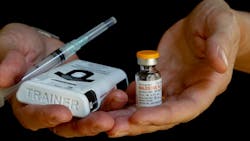Overdose Deaths Dropping, But Narcan Costs Rising
By Christian M. Wade
Source The Eagle-Tribune, North Andover, Mass.
April 9 — Police, firefighters, colleges and public schools are stopping overdoses—and saving money—through bulk purchases of the antidote drug naloxone, but the cost of the anti-opioid medicine is going up.
More than 143 communities-—including Haverhill, Methuen, North Andover and Andover—paid a total of $238,608 for doses of the anti-overdose drug in fiscal year 2017, according to a state Department of Public Health report. Overall, the state bulk-purchasing program distributed more than 8,500 doses of naloxone to cities and towns.
The bulk-buying program was created by lawmakers in 2015 in response to a spike in overdoses that claimed thousands of lives. The state buys the medicine then sells it to communities at reduced cost.
Money to begin the program came from an agreement between Attorney General Maura Healey and Amphastar Pharmaceuticals, which provided $325,000 to acquire and distribute the medicine at reduced rates. But the settlement money that subsidized the program dried up last year. Because of that cities and towns are paying more.
Naloxone, also sold under the brand name Narcan, counteracts the effects of heroin, fentanyl and other opioids by blocking certain receptors in the brain.
In the North of Boston region, Haverhill police bought the most naloxone during the last budget year, which ended June 30, 2017. City police picked up 131 doses, as well as atomizers used to administer the drug. In addition the city’s Fire Department purchased 64 doses.
Haverhill police Lt. John Barbieri, who oversees the department's program, said officers carry at least three doses during shifts.
"We were finding that two doses wasn't enough to revive people, because of the fentanyl," he said. "But we've saved a lot of lives using it."
He said the department used naloxone to revive at least 109 individuals last year who had overdosed on heroin or other opioids. There were five overdose fatalities.
Methuen police and fire bought 115 doses, while North Andover police and fire picked up 65 doses, according to the report.
A box of two 4-milligram doses of Narcan nasal spray now costs $71.02 through the state's bulk-buying program, nearly double what it cost a year ago. A 2-milligram naloxone syringe now costs $29.28, up from $20 a year ago.
Naloxone doses bought commercially—at pharmacies as an injectible product or a nasal spray—run between $75 and $125.
Nearly 2,000 people died from opioid-related overdoses in Massachusetts last year. Essex and Middlesex counties have been hit particularly hard.
The latest data shows the number of deaths trending downward for the first time in 15 years, for which health officials credit the widespread availability of naloxone.
Other state programs give money to police and fire departments in high-risk areas to buy naloxone, and to train first-responders to administer it.
First-responders also get help buying naloxone through agreements with local hospitals, as well as the Police Assisted Addiction and Recovery Initiative.
Naloxone doses distributed through state in FY17
Haverhill Police Department: 131
Haverhill Fire Department: 64
Methuen Police Department: 100
Methuen Fire Department: 15
Andover Police Department: 20
Andover Fire Rescue: 20
North Andover Fire Department: 50
North Andover Police Department: 15
Newburyport Public Schools: 11
Amesbury Police Department: 10
Georgetown Fire Department: 16
Georgetown Police Department: 11
West Newbury Police Department: 4
Beverly Police Department: 17
Swampscott Fire Department: 15
Swampscott Police Department: 26
Lynn Fire Department: 90
Source: Massachusetts Department of Public Health
___
(c)2018 The Eagle-Tribune (North Andover, Mass.) Visit The Eagle-Tribune (North Andover, Mass.) at www.eagletribune.com Distributed by Tribune Content Agency, LLC.






